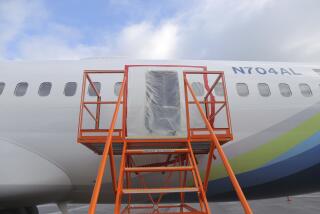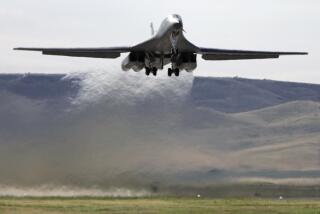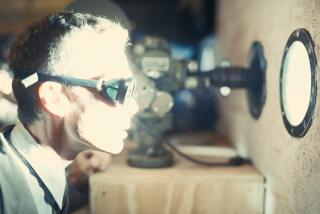Pilots Ignored Bomb Procedures, Officer Says
BARKSDALE AIR FORCE BASE, La. — American pilots moved too quickly in deciding to drop a bomb that killed four Canadian soldiers in Afghanistan, short-circuiting procedures that called for an extensive review of any request to fire, a U.S. officer testified at a military hearing Wednesday.
The testimony came after government lawyers played a grainy videotape showing that Maj. Harry Schmidt requested permission to fire, then disregarded an order to wait and dropped the 500-pound bomb.
Schmidt and his commander, Maj. William Umbach, are the focus of an inquiry here to determine whether they should be court-martialed on charges of involuntary manslaughter. The Air Force contends that they failed to follow proper procedure and failed to make sure there were no allied troops in the area.
Lawyers for the two fliers, formerly full-time Air Force pilots now in the Illinois National Guard, have said the pilots were not told that Canadian troops were conducting live-fire exercises. The pilots contend that light from tracer fire on the ground led them to believe they were under attack by enemy troops during a night patrol.
Transcripts of the pilots’ conversations had been previously released. At the hearing in a makeshift courtroom, the pilots’ words were played, along with a video that showed the attack.
On the tapes, Umbach advised restraint even as Schmidt seemed primed to fire. “Let’s make sure that it’s not friendly,” said Umbach. Schmidt requested clearance to fire and was told to “stand by.”
About a minute and a half later, Schmidt spotted more flashes of light on the ground. “I’ve got someone on the road and it looks like a piece of artillery firing at us.... I am rolling in in self-defense,” he said. “Bombs away.”
The bomb made a direct hit. Seconds later, the Air Force controller ordered: “Disengage. Friendlies. Kandahar.”
“Can you confirm they were firing at us?” Umbach asked the controller.
“You are cleared, self-defense,” the controller replied.
The apparently contradictory messages from the controller were not explained on the tape. As they flew back to Kuwait, Schmidt expressed concern. “I hope that was the right thing to do,” he told Umbach. “Me too,” Umbach said.
Col. Lawrence Stutzrien, who was in an air operations center in Saudi Arabia when the bomb was dropped, testified that the pilots ignored policies that called for elaborate efforts to prevent “friendly fire” incidents.
“Those rules for target approval were tightly controlled,” Stutzrien said. “That was mainly because of the difficulty in telling apart friendlies from enemy, which was very problematic in Afghanistan.”
Only three minutes passed between the time the pilots called in the threat and decided to fire, he said.
“Would three minutes be a normal time for a time-sensitive approval process?” asked Air Force attorney John Odom.
“No,” Stutzrien replied curtly.
The release of the videotape capped a day of testimony in which several Canadian soldiers who survived the bombing said none of them had fired into the air during the training exercises underway at the time. Defense lawyers sought to portray the Canadian troops as prone to bending the rules, eliciting testimony that one had failed to attend a briefing before the training mission and that another had failed to wear his helmet as required.
But the Canadian soldiers said no one in their unit fired their weapons skyward. Machine gun fire that ricocheted off targets did not travel higher than 2,000 feet in the air, they said. Other testimony indicated that the American pilots never dipped below 10,000 feet.
Canadian Cpl. Rene Paquette, who suffered partial deafness from the blast, said he heard the bomb before it struck with a force that threw him into the air. “I felt like I was hit by a truck,” said Paquette. “It flattened me to the ground and literally bounced me -- I was enveloped in a white light.
“I realized I couldn’t call for a medic because my chest was filling up with blood. I was having difficulty breathing. When I sat up, I fell back over. I thought this was probably it. It seemed like an eternity.... Thoughts kept turning to my family and my child born almost to the hour two weeks before the accident. ‘Please give me a chance to see my child and family.’ I woke up in the dark. I wasn’t lying where I was when the bomb hit. I knew I had been thrown somewhere.”
The hearing, which began Tuesday before Lt. Gen. Bruce Carlson, commander of the 8th Air Force based at Barksdale, is expected to last two weeks. Carlson will decide whether to recommend a court-martial. Both Schmidt and Umbach could get up to 64 years in military prison if convicted.
More to Read
Sign up for Essential California
The most important California stories and recommendations in your inbox every morning.
You may occasionally receive promotional content from the Los Angeles Times.










